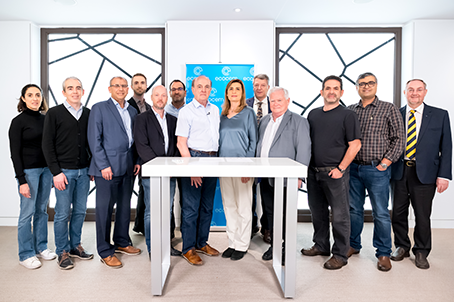Convening at a symposium in Paris hosted by Ecocem, Europe’s leading low-carbon cement technology business, scientists shared latest research papers on low-carbon cement technologies, and focussed on ideas and materials which can accelerate decarbonisation of the sector. The meeting called for the cement and construction sectors to urgently adopt low-carbon cement technologies to radically reduce CO2 emissions.
The scientists concluded that adopting the latest developments in low-carbon cement technology is the quickest and most scalable way to make substantial emission reductions across the cement and construction industries by the end of 2030. During the two-day event, the scientists reviewed new evidence on the use of alternative materials that reduce the volume of clinker, replacing it with a wide variety of locally-sourced filler materials and natural supplementary cementitious materials (SCMs).
In a call to action, the 11 scientists, representing a range of institutions from around the world (a full list of the academics and their institutions can be found in the editors’ notes), said that “It is no longer possible to say that we lack the technology or that the costs are prohibitive.” Materials science has advanced to a point where rapid decarbonisation of cement without excessive cost is now a reality.
Mohend Chaouche, CNRS research director, ENS Paris-Saclay, Laboratoire Mécanique de Paris-Saclay, and director of the CNRS-Ecocem joint laboratory MC²E, said: “The urgency of developing and deploying low-carbon cements is no longer up for debate. ENS Paris-Saclay is very proud to have contributed to the birth of the ACT technology [Manufactured by Ecocem], which reduces the carbon footprint of cement by 70 per cent. The intense years of R&D have paid off.”
Martin Cyr, university professor at University of Toulouse, Laboratory of Materials and Sustainability of Constructions, and director of the joint LMDC-Ecocem ORISON laboratory, added: “Low-clinker technologies developed and validated in the laboratory can now be deployed without scientific or technical barriers. These technologies represent a significant step towards reducing CO2 emissions, ahead of the industry's 2030 roadmap.”
Donal O'Riain, founder and MD of Ecocem, concluded: “I urge the cement sector to move quickly. We have opportunity to be the first industrial sector to comply with a 50 per cent reduction in emissions by the end of 2030. The technology is available to decarbonise the whole cement sector in line with limiting global warming to 1.5°C. It is now our responsibility to ensure this happens.”

A group of leading materials scientists has called for the cement and construction sectors to urgently adopt low carbon cement technologies to radically reduce CO2 emissions
